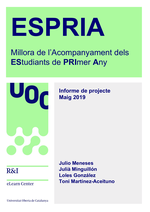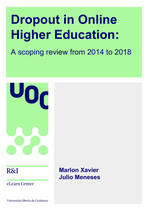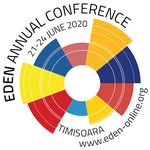ESPRIA: UOC project presented at EDEN 2020 Annual Conference

We presented the results of the ESPRIA project as two interrelated papers during the EDEN 2020 Annual Conference, held this year from 22 to 24 June.
The UOC’s ongoing institutional project entitled ESPRIA, Millora de l’Acompanyment del EStudiants de PRImer Any (ESPRIA, Improving First-year Student Mentoring) aims to boost retention and success of first-year bachelor’s degree students and thus prevent dropout, one of the greatest challenges faced by online higher education. The dropout rate at the UOC is 57.6%, with first semester dropouts accounting for nearly half of this total.
ESPRIA seeks to maximize the impact of course design and institutional support on student retention. Employing institutional learning analytics, first-year students’ enrolment pathways and course design are analysed together with the help of programme directors and the professors responsible for putting together the courses’ learning design and providing flexibility measures in the continuous assessment process. To enhance tutorial quality, ESPRIA-trained advisory staff offer personalized support during the application and enrolment processes, helping first-year students to set realistic and achievable goals and to match their needs with their chosen programme of study. To do so, staff pay particular attention to students’ workload, individual capabilities and time availability, while also spotting early risk situations.
Such measures seek to prevent excessive student workload and to help students achieve their goals in their first and second semesters, so they are motivated to re-enrol in the following ones. However, ESPRIA’s main goal is to help students adhere to and be successful in the continuous assessment process, especially in their first semester. Table 1 shows the number of academic staff members and students involved in ESPRIA since its inception. A total of 16,479 students have participated in ESPRIA thus far.
Table 1. ESPRIA Intervention – Participants.
| Spring 2017 | Autumn 2018 | Spring 2018 | Autumn 2019 | |
|---|---|---|---|---|
| Programmes | 6 | 8 | 9 | 10 |
| Courses | 51 | 69 | 78 | 78 |
| Tenured professors | 46 | 63 | 73 | 76 |
| Academic advisors | 189 | 286 | 311 | 346 |
| Adjunct professors | 217 | 350 | 327 | 445 |
| Students | 1,449 | 5,619 | 2,603 | 6,808 |
The first paper presented at the EDEN 2020 Annual Conference explored the perception of UOC students of ESPRIA intervention measures and their possible advantages or risks. Results indicate that time-related factors represent a major issue for persistence and continuance. ESPRIA intervention measures such as personalized course packages that prevent overlapping submission deadlines, flexibility in continuous assessment, and personalized support and academic advising were valued highly by most students.
The second paper presented a literature review on the definitions and concepts employed in dropout studies. This forms part of a larger scoping review of dropout in online higher education that is also available in the University’s institutional repository. The results highlight the field’s high complexity and disorganization: definitions, when employed, vary widely and tend not to present theoretical continuance. However, most research in the field fails to employ any definitions at all. This is expounded upon in Table 2, based on a sample of studies focusing on dropout. Definitions and concepts are key to dropout studies, for they define how dropout and retention are tackled, measured and researched.
Table 2. Dropout definitions.
| Dropout | n | % | Shared characteristics / Selected references |
|---|---|---|---|
| Definition provided by the author(s) | 11 | 22.45 | Definitions vary widely. Some focus on dropout from a specific institution or programme during a given time period (2 to 4 semesters) (Brock, 2014; Gregori, Martínez, & Moyano-Fernández, 2018). Others focus on dropout from course(s), based on whether students sit their exams (Deschascht & Goeman, 2015; Tan & Shao, 2015). |
| Definition taken from previous literature (Abbad, Carvalho, & Zerbini, 2006; Botsch & Botsch, 2012; Lee & Choi, 2011; Levitz, Noel, & Rizter, 1999) | 4 | 8.16 | Definitions vary widely. Some focus on whether or not students graduate, and whether they do so voluntarily or involuntarily. Others focus on withdrawing from courses, depending also on students’ marks (Franko, 2015; Gangaram, 2015; Grau-Valldosera & Minguillón, 2014; Seabra, Henriques, Cardoso, Barros, & Goulão, 2018). |
| Definition not provided | 34 | 69.39 | Three papers do not provide a definition but employ the concept specifically in relation to courses (Burgos et al., 2018; Croxton, 2014; Mahmodi & Ebrahimzade, 2015). Others mention course or programme (Yang, Baldwin, & Snelson, 2017; Yukselturk, Ozekes, & Türel, 2014) or course or institution (Sanz, Vírseda, García, & Arias, 2018; Woodley & Simpson, 2014). |
| Total | 49 | 100 |
Besides providing proper definitions of the concepts that guide our endeavours, the review also highlights that, in order to tackle dropout and retention, different factors must be taken into account; namely, course and programme factors (student support and learning design), student factors (motivation, time management skills and satisfaction), and environmental factors (time and financial issues). While ESPRIA addresses most of these factors, further efforts will be vital to boosting student success, especially during their first year.
Further reading



